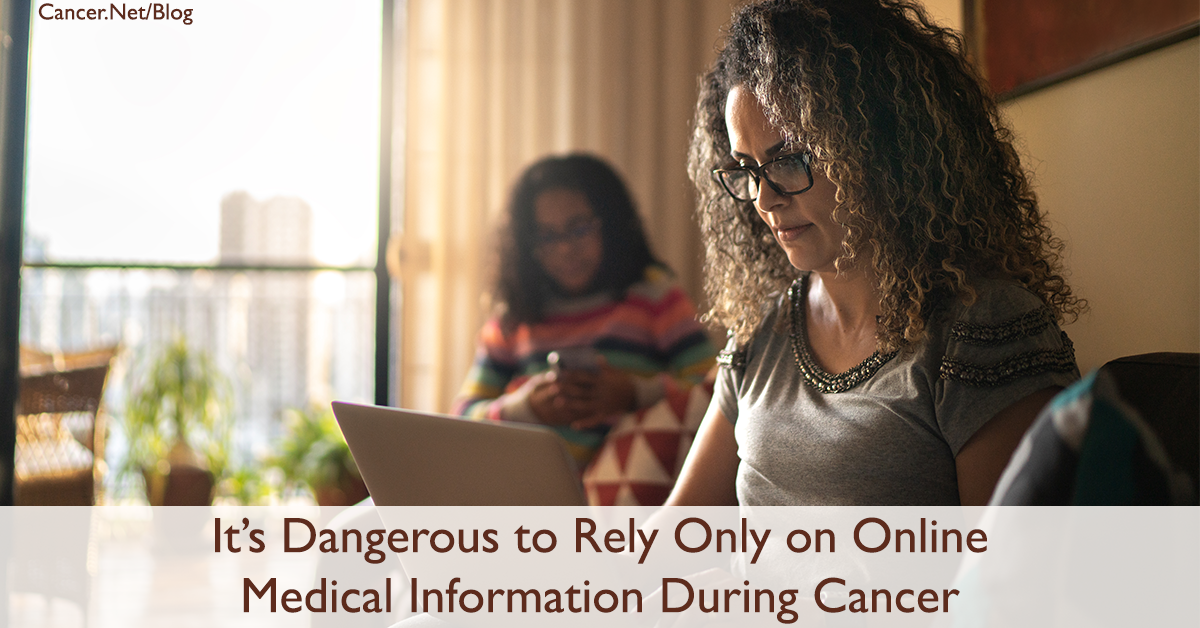
Ann Meredith Garcia Trinidad, MD, MCM, FPCP, FPSMO, FPSO, earned her medical degree and master’s degree from the University of the Philippines and pursued her residency and fellowship training at the UP-Philippine General Hospital. She is currently the Head of the Section of Medical Oncology at the Dagupan Doctors Villaflor Memorial Hospital. Dr. Garcia Trinidad is a board-certified medical oncologist with a special interest in health care social media. You can follow her on Twitter and Facebook. View Dr. Garcia Trinidad’s disclosures.
The internet is an incredible learning resource in today’s fast-paced society, where almost everything can be answered with the click of a button. Certainly, people with cancer and caregivers are no strangers to searching for medical information online, especially when confronted with a life-changing diagnosis.
Researching cancer information online can have plenty of benefits. It can help people understand their diagnosis or feel more confident in the treatment plan being recommended by their physician. It can also help people find support groups and connect with others who are going through similar experiences.
However, as with all forms of technology, the internet is a double-edged sword that has potential drawbacks. That is why it is so important to exercise caution when consulting the internet for medical information. Here, learn what to look out for when seeking cancer information online.
The dangers of searching for medical information online
1: Searching for information about your symptoms online can make you feel worse emotionally.
Researching medical conditions online can deliver results that may be fact-based but don’t offer context, like an individual’s personal situation. This information can be scary and may raise your anxiety level. This may lead you to spending more time searching through site after site seeking reassurance. This form of hypochondria or health anxiety fueled by searching for medical information online is called “cyberchondria.”
2: Not all health information you find online is reliable.
It can be difficult to identify which sources of health information online are trustworthy. Misinformation can lead to making wrong or harmful choices concerning your health. Furthermore, when medical advice from your health care team and unreliable information found online are in disagreement, it can lead to confusion, frustration, and distrust. Always talk with your doctor about questions you have about health information you find online. Learn more about how to tell if online cancer information is reliable.
3: It can delay you getting the treatment you need.
In the case of serious conditions such as cancer, trying to diagnose yourself using online information may mean you miss key symptoms that a doctor could have picked up. Importantly, this false sense of security may delay receiving potentially lifesaving treatment. Always talk with your doctor about any new or worsening signs and symptoms you experience.
Why online cancer information should never replace your real doctor
Face-to-face time with your doctor is a crucial part of the diagnosis and treatment process, especially for cancer. Online information simply cannot replace the years of medical education and clinical experience of a skilled doctor. While online searches may give you a long list of possible answers to your medical queries, it is up to you to select the “right” answer. Meanwhile, doctors can come up with the most logical diagnosis and a tailored treatment plan by integrating clinical data from your health and family history, physical examination, and diagnostic test results.
How to be safe when searching for cancer information online
If you are looking for reliable cancer information online, it is important to:
-
Find credible sources. It is best to seek out information from government agencies, universities, hospitals, and health organizations. For other sources, check the “About” section of the website to see if the site is legitimate and regularly reviewed and updated by medical experts. Avoid unmoderated chatrooms and forums, as well as questionable social media pages.
-
Be skeptical. Question sensational information and stories that are too good to be true. Do not just trust “medical” advice from unverified entities that are selling their own products.
-
Avoid drawing conclusions and making decisions about your health based solely on what you read online. Always consult with your doctor to answer your questions and help put the information you find online into context. No matter what you find, it is important to have your doctor discuss this information with you.





